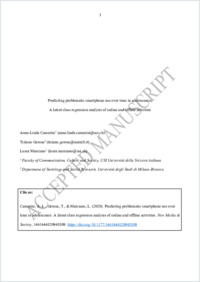Predicting problematic smartphone use over time in adolescence : a latent class regression analysis of online and offline activities
- Camerini, Anne-Linda ORCID Facoltà di comunicazione, cultura e società, Università della Svizzera italiana, Svizzera
- Gerosa, Tiziano ORCID Department of Sociology and Social Research, Università degli Studi di Milano-Bicocca
- Marciano, Laura ORCID Facoltà di comunicazione, cultura e società, Università della Svizzera italiana, Svizzera
- 2020
Published in:
- New Media & Society. - 2020, vol. 23, no. 11, p. 3229-3248
English
Despite today’s ubiquitous nature of smartphones among adolescents, little is known about behavioral online and offline longitudinal predictors of problematic smartphone use (PSU). Guided by Uses and Gratifications Theory, we applied latent class analysis on survey data collected in 2017 from a cohort of 1096 adolescents (Mage = 12.4, SDage = .56) and regressed PSU measured one year later on class membership, controlling for socio-demographic characteristics, social desirability, and autoregressive effects. We extracted four distinct classes: social-recreational onliners (n=228), weekend onliners (n=331), balanced (n=404), and noninvolved (n=153). Characterised by significantly more time spent online for recreational and social networking activities, both during weekdays and weekend days, as well as less time for sleep, the social-recreational onliners class showed significantly higher levels of PSU over time. Future studies should assess not only duration but also the frequency of daily online activities to provide further insights on behavioral predictors of PSU.
- Collections
- Language
-
- English
- Classification
- Information, communication and media sciences
- Other electronic version
- License
-
License undefined
- Open access status
- green
- Identifiers
-
- ARK ark:/12658/srd1325167
- Persistent URL
- https://n2t.net/ark:/12658/srd1325167
Statistics
Document views: 197
File downloads:
- Camerini_etal_NMS_2020: 418
